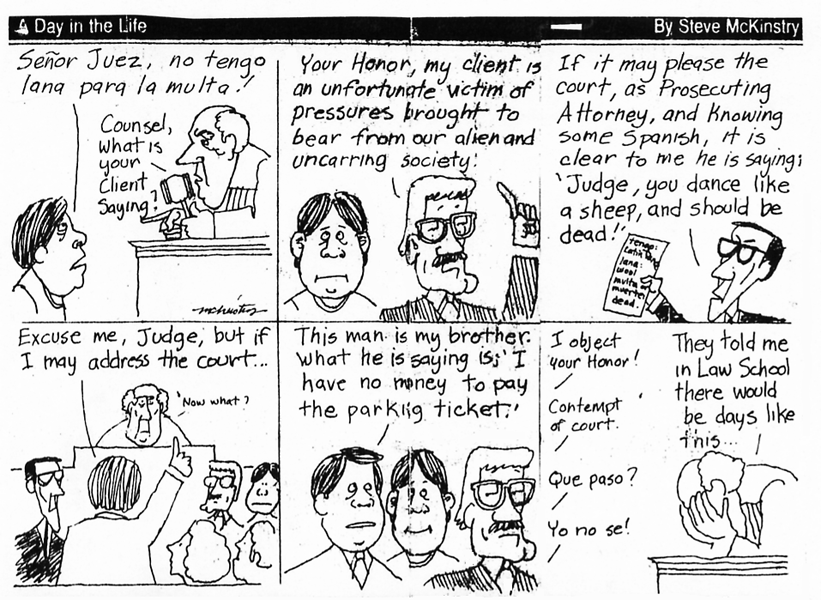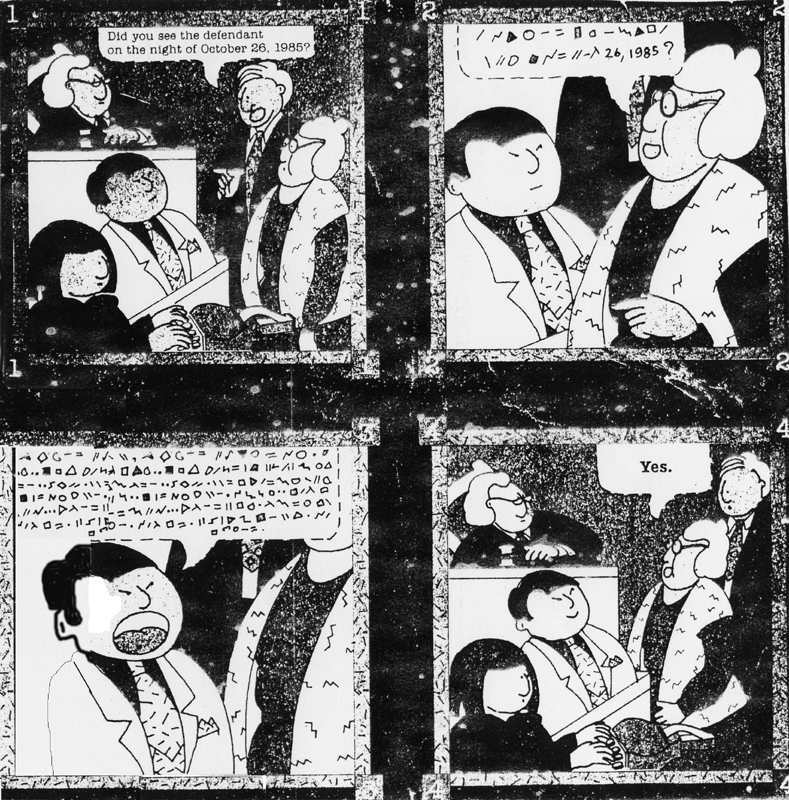Humor and stories for interpreters: Legal interpreting
David Bar-Tzur
Links updated monthly with the help of LinkAlarm.
(The image above is from R.L. Stevens & Associates International, Inc.)

(The image above is from R.L. Stevens & Associates International, Inc.)
 f a deaf person has to go to court, is it still called a hearing?
f a deaf person has to go to court, is it still called a hearing?
 ourt interpreting can be fun!
ourt interpreting can be fun!
Most language is spoken language, and most words, once they are uttered, vanish forever into the air. But such is not the case with language spoken during courtroom trials, for there exists an army of courtroom reporters whose job it is to take down and preserve every statement made during the proceedings. Mary Louise Gilman, the venerable editor of the National Shorthand Reporter, has collected many of the more hilarious courtroom bloopers in two books, Humor in the court and From Mrs. Gilman's two volumes, here are some of my favorite transquips, all recorded by America's keepers of the word:
Q: What is your brother-in-law's name?
A: Borofkin.
Q: What's his first name?
A: I can't remember.
Q: He's been your brother-in-law for years, and you can't remember his first name?
A: No. I tell you I'm too excited (Rising from the witness chair and pointing to Mr. Borofkin.) Nathan, for God's sake, tell them your first name!
Q: Did you ever stay all night with this man in New York?
A: I refuse to answer that question.
Q: Did you ever stay all night with this man in Chicago?
A: I refuse to answer that question.
Q: Did you ever stay all night with this man in Miami?
A: No.
Q: Now, Mrs. Johnson, how was your first marriage terminated?
A: By death.
Q: And by whose death was it terminated?
Q: Doctor, did you say he was shot in the woods?
A: No, I said he was shot in the lumbar region.
Q: What is your name?
A: Ernestine McDowell.
Q: And what is your marital status?
A: Fair.
Q: Are you married?
A: No, I'm divorced.
Q: And what did you husband do before you divorced him?
A: A lot of things I didn't know about.
Q: And who is this person you are speaking of?
A: My ex-widow.
Q: How did you happen to go to Dr. Cherney?
A: Well, a gal down the road had had several of her children by Dr. Cherney, and said he was really good.
Q: Do you know how far pregnant you are right now?
A: I will be three months November 8th.
Q: Apparently then, the date of conception was August 8th?
A: Yes.
Q: And what were you and your husband doing at that time?
Q: Mrs. Smith, do you believe that you are emotionally unstable?
A: I should be.
Q: How many times have you committed suicide?
A: Four times.
Q: Doctor, how many autopsies have you performed on dead people?
A: All my autopsies have been performed on dead people.
Q: Were you acquainted with the deceased?
A: Yes, sir.
Q: Before or after he died?
Q: Officer, what led you to believe the defendant was under the influence?
A: Because he was argumentary and he couldn't pronunciate his words.
Q: What happened then?
A: He told me, he says, "I have to kill you because you can identify me.
Q: Did he kill you?
A: No.
Q: Mrs. Jones, is your appearance this morning pursuant to a deposition notice I sent to your attorney?
A: No. This is how I dress when I go to work.
THE COURT: Now, as we begin, I must ask you to banish all present information and prejudice from you minds, if you have any.
Q: Did he pick the dog up by the ears?
A: No.
Q: What was he doing with the dog's ears?
A: Picking them up in the air.
Q: Where was the dog at this time?
A: Attached to the ears.
Q: When he went, had you gone and had she, if she wanted to and were able, for the time being excluding all the restraints on her not to go, gone also, would he have brought you, meaning you and she, with him to the station?
MR. BROOKS: Objection. That question should be taken out and shot.
Q: And lastly, Gary, all you responses must be oral. OK? What school do you go to?
A: Oral.
Q: How old are you?
A: Oral.
Q: What is your relationship to the plaintiff?
A: She is my daughter.
Q: Was she your daughter on February 13, 1979?
Q: Now, you have investigated other murders, have you not, where there was a victim?
Q: And what did he do then?
A: He came home, and next morning he was dead.
Q: So when he woke up the next morning he was dead?
Q: Did you tell you lawyer that your husband had offered you indignities?
A: He didn't offer me nothing; he just said I could have the furniture.
Q: So, after anesthesia, when you came out of it, what did you observe with respect to your scalp?
A: I didn't see my scalp the whole time I was in the hospital.
Q: It was covered?
A: Yes, bandaged.
Q: Then, later on, what did you see?
A: I had a skin graft. My whole buttocks and leg were removed and put on top of my head.
Q: Could you see him from where you were standing?
A: I could see his head.
Q: And where was his head?
A: Just above his shoulders.
Q: What can you tell us about the truthfulness and veracity of this defendant?
A: Oh, she will tell you the truth. She said she'd kill that sonofabitch and she did!
Q: Do you drink when you're on duty?
A: I don't drink when I'm on duty, unless I come on duty drunk.
Q: Any suggestions as to what prevented this from being a murder trial instead of an attempted murder trial?
A: The victim lived.
Q: Are you sexually active?
A: No, I just lie there.
Q: Are you qualified to give a urine sample?
A: Yes, I have been since early childhood.
Q: The truth of the matter is that you were not an unbiased, objective witness, isn't it. You too were shot in the fracas.
A: No, sir. I was shot midway between the fracas and the naval.
Q: What is the meaning of sperm being present?
A: It indicates intercourse.
Q: Male sperm?
A: That is the only kind I know.
Q: (Showing picture.) That's you?
A: Yes, sir.
Q: And you were present when the picture was taken, right?
Q: Was that the same nose you broke as a child.
A: I have only one, you know.

 ear! Hear!
ear! Hear!
At an assize town [Brit. trial] a juryman said to the clerk, "Speak up! I can't hear what you say." Baron Alderson, who presided, asked him if he was deaf, and on the juryman answering, "Yes, with one ear," replied, "Well then you may leave the box, for it is necessary that jurymen should hear both sides."
 oicing in a legal setting: the Deaf person signed "all messed up". I voiced "And this caused a brouhaha". The lawyer then asked the deaf person how to spell that. Of course this was in the conduit days and I was mortified. Well, after the lawyer and the client talked they found out where the problem was. Yup, yours truly had to fess up. I was mortified.
oicing in a legal setting: the Deaf person signed "all messed up". I voiced "And this caused a brouhaha". The lawyer then asked the deaf person how to spell that. Of course this was in the conduit days and I was mortified. Well, after the lawyer and the client talked they found out where the problem was. Yup, yours truly had to fess up. I was mortified.
 hy they're called trials. . .
hy they're called trials. . .
Here is something from one of my trials:
Atty: I. . . let me rephrase that.
!!!???!!!

 eported in the Massachusetts Bar Association Lawyers Journal, the following are questions actually asked of witnesses by attorneys during trials and, in certain cases, the responses given by insightful witnesses:
eported in the Massachusetts Bar Association Lawyers Journal, the following are questions actually asked of witnesses by attorneys during trials and, in certain cases, the responses given by insightful witnesses:
Q: Now doctor, isn't it true that when a person dies in his sleep, he doesn't know about it until the next morning?
Q: The youngest son, the twenty-year old, how old is he?
Q: Were you alone or by yourself?
Q: Was it you or your younger brother who was killed in the war?
Q: How far apart were the vehicles at the time of the collision?
Q: You were there until the time you left, is that true?
Q: She had three children, right?
A: Yes.
Q: How many were boys?
A: None.
Q: Were there any girls?
Q: You say the stairs went down to the basement?
A: Yes.
Q: And these stairs, did they go up also?
Q: Mr. Slatery, you went on a rather elaborate honeymoon, didn't you?
A: I went to Europe, sir.
Q: And you took your new wife?
Q: Can you describe the individual?
A: He was about medium height and had a beard.
Q: Was this a male, or a female?
Q: Do you recall the time that you examined the body?
A: The autopsy started around 8:30 p.m.
Q: And Mr. Dennington was dead at the time?
A: No, he was sitting on the table wondering why I was doing an autopsy.
Q: Doctor, before you performed the autopsy, did you check for a pulse?
A: No.
Q: Did you check for blood pressure?
A: No.
Q: Did you check for breathing?
A: No.
Q: So, then it's possible that the patient was alive when you began the autopsy?
A: No.
Q: How can you be so sure, Doctor?
A: Because his brain was sitting on my desk in a jar.
Q: But could the patient have still been alive nevertheless?
A: It is possible that he could have been alive and practicing law somewhere.
 nsane in whose culture?
nsane in whose culture?
A non-English speaker being tried in Australia for some offence in which behaviour was involved which might have reasonably been construed as bizarre was asked how he had felt on the day in question. In reply, he said something which was rendered literally into English as: "I was a god among gods." He was ordered to be confined in a closed institution for psychiatric evaluation. Eventually, it was discovered that in his language what he had said was the equivalent of "I was on top of the world." Eventually, also, he was released from the psychiatric institution.
 Return to the table of contents for "Humor and stories for interpreters".
Return to the table of contents for "Humor and stories for interpreters".
